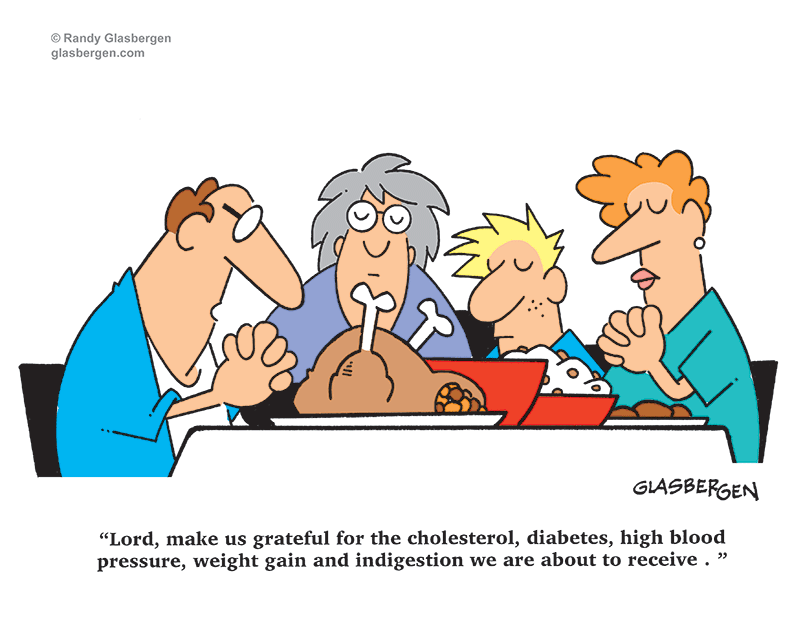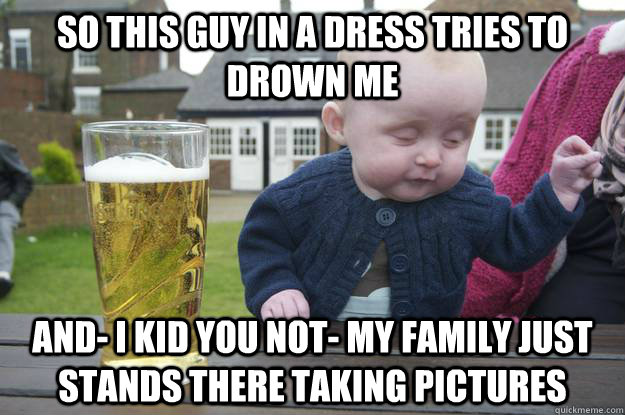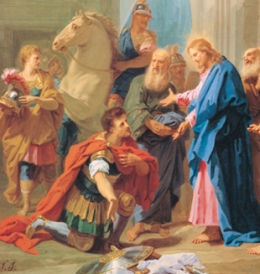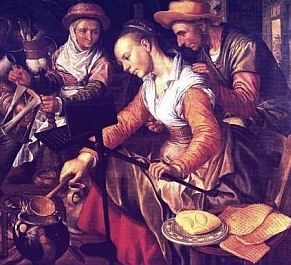
Volume I/ Issue 11 / February 2017

From the Editorial Desk:
The Foundation Of A Godly Home.
This Month emphasis is on the Holy Family. but more specifically the topics will be focused on the Catholic Family. The Father, the Mother, the raising of Children etc. There is so little out there that is Catholic oriented and I hope and pray that this issue of the Olive Tree with be a small fire that will light you up a little bit to be more on board with what a Catholic Family should be like. My editorial is actually a book I am working on. It takes a lot of work so I do not know how long it will be before it is published. But here a little taste of what's coming!
In the Old Testament book of the bible, Malachi 2:15 says that God is seeking a Godly seed. That is what this month's news letter is about.
God is seeking a Godly seed not because you want your children to be right not because I would want them to be right, but because God, the God of heaven is seeking a Godly seed. Dear brothers and sisters nobody seeks like God does. And because he is seeking a Godly seed, we have come to join in with the mysterious working of God's Spirit in the last days.
According to Malachi 4:5, the Spirit of God is working in the hearts of fathers and turning their hearts to their children and he's working in the hearts of the children to turn their hearts toward their fathers and we have come to join in with that mysterious work. I promise you that if your heart will be open to the Spirit of God you will get a radical turning of your heart because the Spirit of God is brooding over our homes God is causing men everywhere to repent of their ungodly focuses.
I believe nothing will turn or affect the nation that we live in, more than Spirit anointed Godly families. God is desiring to lift up Catholic families that can be a Godly example for the enemy to see.
How do you do that? How do you raise your children to be a testimony to the world of what a Catholic home should be like?
Well, the Scripture says train up a young child in the way that he should go and when he is old he will not depart from it. (Proverbs 22)
God has given us ways and means by which we can get our children to follow God's ways. All these words of wisdom that are in these pages are hidden in God's Word and they are there for us to dig them out whenever we need them.
What do I mean by foundation of a Godly home?
A foundation of a Godly home consist of a conversion in the life of the Parents. Many of us as Catholics have grown up as what we call “cradle Catholics.' That is we were born into a family that was Catholic. Understand this, as a baby you were baptized. You were given a new heart, made holy unto God because of the faith of your parents. (I Corinthians 7:14) But at some point in your life you must make your own conversion. That is, there must come a time when you take your parents Catholic Faith and make it your own. For the rest of us who were not cradle Catholics, when conversion came about we realized that we were by nature sinners who if we were to die, would spend eternity in Hell. We had to repent of our sins, and receive a heart made new by accepting that Christ died for our sins, and then go through the sacramental waters of baptism.
Conversion means that a life-changing salvation experience is the beginning.
Matthew 7:21-27
Not every one that saith to me, Lord, Lord, shall enter into the kingdom of heaven: but he that doth the will of my Father who is in heaven, he shall enter into the kingdom of heaven. Many will say to me in that day: Lord, Lord, have not we prophesied in thy name, and cast out devils in thy name, and done many miracles in thy name? And then will I profess unto them, I never knew you: depart from me, you that work iniquity. Every one therefore that heareth these my words, and doth them, shall be likened to a wise man that built his house upon a rock, And the rain fell, and the floods came, and the winds blew, and they beat upon that house, and it fell not, for it was founded on a rock. And every one that heareth these my words, and doth them not, shall be like a foolish man that built his house upon the sand, And the rain fell, and the floods came, and the winds blew, and they beat upon that house, and it fell, and great was the fall thereof.
The word “house” ( in the Greek), can also mean household not just a building. (See Matthew 10:13, Matthew 12:25)
When we look at our home, when we look at our family, first thing must come first. We don't want to get the cart before the horse. When it comes to a Horse and a cart, if you put the cart before the horse things will not work right. Think about it. You have the cart and you have the horse behind it. Where are you going to go? You make plans for a trip. You are going to start on Monday and your goal is to get to your destination by Wednesday evening. But the problem is that you have the cart before the horse! You are not going to get anywhere like that.
I'm afraid it's the same way with the home. If the Parents are not surrendered to Christ in their home they will not have a godly home. Now we might be able to pass on some religion but you can't have a godly home. You can not set out on a journey to raise godly children without you, as the Mom and Dad, having that conversion experience, that relationship with God. If you try, it is like putting the cart before the horse. It just will not come out right. It's going to be pretty difficult to try to have a godly home without Christ.
So before you read anything else about the Home in the articles we have for you this month. Realize that none of it will work well without that conversion in the lives of the Mothers and Fathers
May God bless you as you continue to read!


The Nature of a Catholic Motherhood
When we come of age and start reflecting on what God has in mind for us it is a very intense time that includes patience and complete trust in God. Not all of us are meant to become mothers and have a family while others are called to serve the Lord in more of a consecrated way as a religious.
As a Priest I help many people especially our youth to find God's Calling and also make them aware of the time and patience involved. Sometimes it takes years to find the calling or even a partner in life that you want to share everything with. It isn’t that easy as our modern society and views has changed from a traditional background into a liberal side.
To be honest, as Catholics or Faithful Christians we have to follow God and go His way. I strongly believe that Purity is very important for a good Catholic Youth and Pre marital intimacy should not be practiced as our bodies are temples of the Holy Ghost which has been given to us at our baptism.
Or know you not, that your members are the temple of the Holy Ghost, who is in you, whom you have from God; and you are not your own? For you are bought with a great price. Glorify and bear God in your body. (I Corinthians 6:19-20)
We should learn how to battle sin before entering marriage.
I seem to be from a different century due to my opinions but at least I can assure the dignity of Christian morals and respect for ourselves and our brothers and sisters in Christ.
We need to learn how to be disciplined and also strong in faith and prayer in order to be good roll models for our future children.
Courtship is a must for young adults because it is better to marry a best friend then a lover as lovers can pass but friendship can be more of a love then the chemical attraction or needs that is usually controlled by hormones and can lead into sin where if we know the person first and build up a friendship we know what to expect in marriage. Christian life is very important that means going to mass together and praying together as that will lead to a praying family. A Spiritual Father is very good for young couples discerning marriage and later on as married couples with kids. But at the same time a Spiritual Mother is also of great importance.
Before entering marriage the couple should be clear about important topics and prepared and given support by the community.
My mother, nor my entire family were practicing Christians so I missed out on what I think is important for religious married couples and parents rolls.
Regarding a Traditional Catholic Mother I can expect that she has a strong devotion to Our Lady who is the patron of all Mothers as they should strive to be like Mary just as Joseph is for fathers.
Our Catholic faith should be in the centre of family life and it is up to the parents to educate their children in a God fearing environment. Family Prayer time should be attended by all members and it should not make a difference which day it is or how old the kids are.
Prayer needs to be taught at a very early age.....
and the young children should get involved in Sunday Mass and make it a ritual that is taken into daily life. Have the Parish Priest or Pastor involved by inviting him to the house for a blessing and a meal so that the kids are used to vocations and that Priests are normal people too as in our modern society there is a huge segregation between clergy and lay people. Have the entire family there when the Priest calls.
As a mother, she should encourage her children in being altar servers, help keeping the parish clean, finding ways to serve in their Parish. Being involved in the Parish fosters vocation like it did with myself when I converted to Catholicism. Priests should encourage Parents and Kids to support the community.
I am not a sexist but I do advise mothers not to work 100% and concentrate themselves in the dedication to bring up their children especially when they are still young. Try to find ways of making money that keeps you more at home. The Proverbs 31 mother is a great example of helping to provide for the needs of the family without having to be away from the home all the time.
"Who can find a virtuous woman? for her price is far above rubies. The heart of her husband doth safely trust in her, so that he shall have no need of spoil.
She will do him good and not evil all the days of her life. She seeketh wool, and flax, and worketh willingly with her hands. She is like the merchants' ships; she bringeth her food from afar. She riseth also while it is yet night, and giveth meat to her household, and a portion to her maidens.
She considereth a field, and buyeth it: with the fruit of her hands she planteth a vineyard. She girdeth her loins with strength, and strengtheneth her arms. She perceiveth that her merchandise is good: her candle goeth not out by night. She layeth her hands to the spindle, and her hands hold the distaff. She stretcheth out her hand to the poor; yea, she reacheth forth her hands to the needy.
She is not afraid of the snow for her household: for all her household are clothed with scarlet. She maketh herself coverings of tapestry; her clothing is silk and purple. Her husband is known in the gates, when he sitteth among the elders of the land. She maketh fine linen, and selleth it; and delivereth girdles unto the merchant.
Strength and honour are her clothing; and she shall rejoice in time to come. She openeth her mouth with wisdom; and in her tongue is the law of kindness. She looketh well to the ways of her household, and eateth not the bread of idleness. Her children arise up, and call her blessed; her husband also, and he praiseth her. Many daughters have done virtuously, but thou excellest them all. Favour is deceitful, and beauty is vain: but a woman that feareth the Lord, she shall be praised. Give her of the fruit of her hands; and let her own works praise her in the gates."
The Catholic Mother should be concerned in what her kids are exposed....
to that means with the media and in society. I do not advise allowing the kids to use the internet neither having a cell phone to early but teaching them why they should be careful. Also try to control what friends they have and what environment they will be in in their free time. Try to build up good friendships with other families from a Christian background. When they are in their teenage age or older years get them wanting to involve themselves with youth work and parish youth clubs. Don’t let them go out at night into clubs where they are exposed to immoral sexual behaviour and educate them about immoral sexual behaviours beforehand. Instead of wasting their time in a club or hanging around doing nothing, have them learn an instrument and play in an orchestra or do social work that also brings more achievements in their life for future purpose.
As a mother the educational importance should be regarded as the key. It also makes a difference which school catholic children should attend. Personally I am fond of the traditional Catholic Schools or good Christian schools that foster religious vocations and that are sensitive about topics such as science or sexual education and make sure that un natural behaviours don’t get tolerated.
Bringing up good Christian Children is the job of the parents as they should both teach their children to follow God's Commandments and learn the Scripture and bring it into their daily life. Also Teach them that they should express their faith even when they get criticised and learn how to defend the faith against the unbelievers.
In this day and age it is isn’t easy to bring up good God fearing Children but when the parents have faith and put God first then every nutshell can be cracked.
Let us pray for more God fearing Mothers and let us also pray for God fearing Families.
The Funny Pharmacy
Proverbs 17:22
A joyful mind maketh age flourishing: a sorrowful spirit drieth up the bones.






Questions and Answers
Was Vatican II The Beginning Of The Crisis In The Church?
Many date the problems in the Catholic Church to the Second Ecumenical Council of the Vatican, called by Antipope John XXIII-II, and the liturgical changes that flowed from its spirit.
On December 4, 1963, Vatican II issued the decree Sacrosanctum concilium on the liturgy. Even before the close of the Council in 1965, supporting instructions began to be issued to implement this decree and a series of changes in the Mass, Rites of the Sacraments and the liturgy as a whole began to be implemented. As these became more radical, people began to notice them and begin to take action. For this reason, this time period of the changes as they came to be called from 1960 until 1972, when the Novus Ordo Missae (New Rite of the Mass) was fully implemented and the Rites of the Sacraments had all been substantially changed, except for Baptism, came to be identified as the beginning of the Crisis in the Church.
First of all the liturgical changes, which were a disaster, are only a symptom of a far deeper problem.
Much can be said on these liturgical changes, but they are only the tip of the iceberg.
Above we placed a date of 1960, when Antipope John XXIII-II issued the decree Rubricarum Instructum. Although there is nothing objectionable in the decree itself, the principle upon the changes made at the time are dubious at best. The revision of the calendar denigrated the Blessed Virgin Mary, demoting some of her feasts to mere commemorations. It also removed some feasts as useless repetitions, a principle repeated in Vatican II: “The rites should be distinguished by a noble simplicity; they should be short, clear, and unencumbered by useless repetitions; they should be within the people's powers of comprehension, and normally should not require much explanation.” (Paragraph 34 of Sacrosanctam concilium) A supporting decree to Rubricarum Instrucutm said historical lessons of the Breviary needed to be corrected to insure of their historical accuracy. Also some feasts were removed as useless repetitions as well. And so the spirit of Modernism was now becoming an official part of the Church.
However the rottenness that led to Vatican II had been working for over a century. It is said that the Devil told St. John Vianney, “If there were three such priests as you, my kingdom would be ruined.” Consider this well. The first conclusion is that there were not three priests as zealous as Saint John Vianney. The rottenness was already happening. Although we can trace the problems to before the Protestant Revolt nearly five centuries ago, it became worse in the 19th century with the heresies of Liberalism and Modernism.
Liberalism begat Modernism as a bastard child.
In his Encyclical, Pascendi, against Modernism in 1907, Pope Saint Pius X warned: “That We make no delay in this matter is rendered necessary especially by the fact that the partisans of error are to be sought not only among the Church's open enemies; they lie hid, a thing to be deeply deplored and feared, in her very bosom and heart, and are the more mischievous, the less conspicuously they appear. We allude, Venerable Brethren, to many who belong to the Catholic laity, nay, and this is far more lamentable, to the ranks of the priesthood itself, who, feigning a love for the Church, lacking the firm protection of philosophy and theology, nay more, thoroughly imbued with the poisonous doctrines taught by the enemies of the Church, and lost to all sense of modesty, vaunt themselves as reformers of the Church; and, forming more boldly into line of attack, assail all that is most sacred in the work of Christ, not sparing even the person of the Divine Redeemer, whom, with sacrilegious daring, they reduce to a simple, mere man.” 1 He realized that The Enemy had already begun infiltrating the Church.
And we should immediately clarify who The Enemy is. Saint Paul tells us: “For our wrestling is not against flesh and blood; but against principalities and power, against the rulers of the world of this darkness, against the spirits of wickedness in the high places.” 2 So our real enemy is the Devil, not our fellow men. However, we should know that some people work willingly with the Devil for the destruction of the Devil's main enemy, the Church of God, the Catholic Church.
Many look at the various people involved, and consider they are The Enemy. They may be working with The Enemy, but they are poor souls in need of our prayers for their conversion.
Read Carefully
Joseph Ratzinger, later Benedict XVI wrote: ‟For believers, it was a remarkable phenomenon that their bishops seemed to show a different face in Rome from the one they wore at home. Shepherds who had been considered strict conservatives suddenly appeared to be spokesmen for progressivism.” 3
First Joseph Ratzinger is saying that the bishops had been looking Catholic at home, but when they got to Vatican II, they realized that this was no longer necessary, as the Papacy had been usurped by John XXIII. Basically, while the cat is away the mice will play. In other words, they had already determined to betray our Lord Jesus Christ, but were awaiting the appropriate time. They had already been corrupted by the world, the flesh and the devil, but especially by The Enemy.
We have discussed the infiltration of the Catholic Church. The Enemy works through Secret Societies, such as the Masons, the Illuminati, the Rosicrucians, the Priory of Zion, and even certain elements of Jews. (To call this a Jewish Conspiracy is to limit the operations of The Enemy. This is a trap many have fallen in to with disastrous consequences.) Even the Communists sent in covert operatives to assist The Enemy. Pope Saint Pius X knew these agents were at work and attempted to halt their activity, but was unsuccessful.
But to lay the blame for this crisis at the feet of those men who dedicated their lives to destroying the Catholic Church is a great error.
Actually the main problems were the bishops and priests, who lived a worldly life.
They failed to teach their flocks how to pray fervently, because they themselves were lukewarm. “But because thou art lukewarm, and neither cold, not hot, I will begin to vomit thee out of my mouth.” (Apocalypse 3:16) All Christians must be on fire with the love of God. Most had let their light go out. “No man lighteth a candle, and putteth it in a hidden place, nor under a bushel; but upon a candlestick, that they that come in, may see the light.” (Luke 11:23) Bishops and priests, who are supposed to be the leaders of the light of the world, (Matthew 5:14) let their lamps go out like the foolish virgins. (Matthew 25:1-13)
Vatican II was the culmination of centuries of work, which began in earnest in the fifteenth century with Huss and Wycliffe. Their spiritual children, beginning with Martin Luther, started the Protestant Revolt, separating millions from Jesus Christ's Church. And this continued with heresies, such as Jansenism and Gallicanism in the seventeenth century. The eighteenth century saw the foundation of the first Constitutionally atheistic country in history, the United States and at the same time the French Revolution, both of which declared the rights of man. These two revolts declared that man has a right to practice whatever religion he pleases and that the government can in no way interfere with this right. In other words, everyone now has the right to be wrong and to preach falsehood to any and all who will listen.
Pope Pius IX reminded us of the principle that error has no rights, nor should it ever have rights. At best it may be tolerated to prevent some worse evil. However, we must always remember that error is an evil.
Vatican II declared the doctrine that error has rights in the Declaration on Religious Freedom, Dignitatis Humanae. “This Vatican Council declares that the human person has a right to religious freedom. This freedom means that all men are to be immune from coercion on the part of individuals or of social groups and of any human power, in such wise that no one is to be forced to act in a manner contrary to his own beliefs, whether privately or publicly, whether alone or in association with others, within due limits. The council further declares that the right to religious freedom has its foundation in the very dignity of the human person as this dignity is known through the revealed word of God and by reason itself. This right of the human person to religious freedom is to be recognized in the constitutional law whereby society is governed and thus it is to become a civil right.”
Pope Pius IX condemned this in the Syllabus of Errors: “79. Moreover, it is false that the civil liberty of every form of worship, and the full power, given to all, of overtly and publicly manifesting any opinions whatsoever and thoughts, conduce more easily to corrupt the morals and minds of the people, and to propagate the pest of indifferentism. -- Allocution "Nunquam fore," Dec. 15, 1856.” And “77. In the present day it is no longer expedient that the Catholic religion should be held as the only religion of the State, to the exclusion of all other forms of worship. -- Allocution "Nemo vestrum," July 26, 1855.” And further: “78. Hence it has been wisely decided by law, in some Catholic countries, that persons coming to reside therein shall enjoy the public exercise of their own peculiar worship. -- Allocution "Acerbissimum," Sept. 27, 1852.”
In his book, Les Principe des Theologie Catholique, Joseph Ratzinger states: ‟Let us content ourselves here with stating that the text [of the Vatican II Constitution, Gaudium et spes] plays the role of a counter-Syllabus to the measure that it represents an attempt to officially reconcile the Church with the world as it had become after 1789.” What Ratzinger is saying is that Vatican II changed the errors condemned in the Syllabus of Errors by Pope Pius IX into truth, which is impossible. Can two plus two equal four a century ago and twenty-two today?
Truth cannot change, but this is what Vatican II said. However, the seeds of this were planted long ago, and they have now grown into a large tree. Pope Saint Pius X condemned the errors of Modernism and his predecessor Pope Pius IX also condemned these errors as have other Popes. As we have seen, Pope Saint Pius X knew that these errors were held not only by those outside of the Church, but by those in her very bosom. Unfortunately his efforts to rid the Church of these wolves in sheep's clothing (Matthew 7:15) was unsuccessful and over the next half of a century they moved forward and were able to call the Council, which is falsely called Vatican II. It is not a successor to the only Vatican Council held in 1869-70, but a convention of heretics much like the Jansenist Synod of Pistoia held several centuries earlier. In fact, some of the errors of the Synod of Pistoia can be found also in Vatican II.
1 Pascendi, Pope Saint Pius X, September 8, 1907, paragraph 2
2 Ephesians 6:12
3 Milestones, page 132


General Rules For Raising A Catholic Family
If you think about all of the difficult jobs in the world today, I would imagine that the job of "Raising a Catholic Family" would probably be near the top of the list. Certainly, in today's culture in which we live, raising a family is difficult enough. Period! But raising a family with any sort of faith-based foundation is even more difficult. Let's face it, in our society which we find ourselves today, the world is so "Anti-religion," "Anti-faith," "Anti-God," etc. that it is a daunting task to remain a good Christian our self, let alone raise a Christian family. In this out of control world, the odds of raising a Catholic family seem overwhelming, to say the least. But fear not, nothing is impossible with God's help . . . even raising children. Let us reflect on some good "general rules" when raising a good Catholic family:
Rule Number One: Always Stay Close To God . . . .
Rule Number Two: The Importance Of Prayer . . . .
Communication is key to any relationship. Whether we are talking about the relationship between a husband and wife or an employee-employer relationship, for that matter, good communication is the key. Thus, communication between ourselves and God is of utmost importance as well. On this I am sure we will agree. Communication with God is what we call "prayer." Let your children know how important prayer is . . . and should be . . . in their life. "Then Jesus told His disciples a parable to show them that they should always pray and not give up." (St. Luke 18:1) Teach your children to always go to God in prayer. Let them know that God is always ready to hear our prayers. Communal prayers done in unison can form a good foundation for more personal, individual prayer later on. For example, children should be taught early on prayers such as the "Our Father" and the "Hail Mary" and the "Glory Be." Children should be taught the Rosary so that not only can they pray it on their own but families can also pray the Rosary together in unison. Let your children know early on that prayer is a powerful weapon. A former bishop of mine was keen to often say: "Play dirty and pray . . . " In other words, his meaning was that prayer is a powerful weapon that most people do not utilize. When we pray, we are in the presence of the Almighty. Let your children know how important this is. Good communication is the key to any good relationship. And prayer is our communication with the Almighty. Encourage your children to communicate daily with God: whether it be saying grace before meals; praying the Rosary either alone or as a family; or just sitting in the presence of God reflecting after reading Scripture or in the presence of the Blessed Sacrament in Church.
Rule Number Three: Going To Church As A Family . . . .
Rule Number Four: Be A Strong Role Model In The Faith . . . .
After reading through these various "rules" so far, I hope that you have been able to see a "constant theme" through each rule: to lead by example. This is something that needs to be emphasized time and time again, in my humble opinion. As stated above, children will not practice what they have not been taught. And whether we like it or not, children learn mostly by what they see being done. St. Paul writes: "Fathers, do not provoke your children to anger; but bring them up in the discipline and instruction in the Lord." (Ephesians 6:4) We teach by instruction, yes, but the best "instruction" comes first by example. As parents, we need to allow our children to see how we actually lead our life . . . . how we live our life . . . . if children "see" that we do our best to live good, Christian lives, they will be more willing to "listen" to why we do it. Children, , . . . and adults, for that matter . . . . will not listen to someone who "talks the talk" but doesn't "walk the walk." As a parent, if you tell your child how important it is to go to church, for example, but that child never sees you never attend church yourself, the child will see that your words are hollow and you don't even follow your own advice, . . . so why should they? We parents need to instruct, yes, but first and foremost we need to "instruct" through our own actions. We need to "instruct" first by the way in which we lead our own life, by the way we live our own life.

The Pope Speaks

Having the Best Lent of Our Lives
In the Gospel for the Third Sunday after Epiphany we read the story of the Centurion, who said to Jesus: “Lord, I am not worthy that You should enter under my roof, but only say the word, that my servant shall be healed.” The Church has adapted these words and repeats them three times before Holy Communion.
Yes, we are unworthy, but we must prepare ourselves and bring ourselves to the Lord's table.
“So great is the efficacy of the adorable Eucharist, that one single Communion, if well made, would suffice to raise us to sublime sanctity.” (In the book, Solid Virtue). Elsewhere, in the same book, we are told one Communion is sufficient to make us a saint.
Consider this well. We are approaching the holy season of Lent.
We should also prepare ourselves to make a Communion so well, that God makes us saints. Let us pray to Him for this holy grace. Let us focus our meditations and our thoughts outside of our time of meditation on the "best part" (Luke 10:42) as did Saint Mary Magdalene.
And what was that best part? It was sitting at the Lord's feet, hearing his word. Not just letting the words of the Lord going in one ear and out the other. But to take it in...to soke His words up....to take Jesus words to heart. Allowing His words to change us from the inside out. If we do this, if we will sit at His feet and truly listen to His words, Jesus says, it will not be taken from us.
This must be the best Lent we have made in our lives, but why wait until Lent. Let us begin bringing our hearts and our minds to Almighty God. Let us ask Him to help us in this holy task.
Oremus,
+Michael pp
Note, We recommend you look up the Scriptures that We and others make reference to.

New Videos from our YouTube Channels
Living Catholic

Acceptance of Self
Forming Attitudes About Ourselves
Our attitude toward ourselves has a profound influence on our attitudes toward God, our family, our friends, our future, and many other significant areas of our lives. When we have a wrong attitude about ourselves it affects every other relationship we have in our life. Because of this we should develop these attitudes in a Godly way.
This is what happens when we develop wrong attitudes: We end up measuring ourselves with the outward standards of those around us in order to gain approval. Instead we should be comparing ourselves with the inward character of Jesus Christ in order to receive God's Approval.
(John 5:44) How can you believe, who receive glory one from another: and the glory which is from God alone, you do not seek?
(II Corinthians 10:17, 18) But he that glorieth, let him glory in the Lord. For not he who commendeth himself, is approved, but he, whom God commendeth.
(II Corinthians 12:12) For we dare not match, or compare ourselves with some, that commend themselves; but we measure ourselves by ourselves, and compare ourselves with ourselves.
Evidences of Self-Rejection
As we grow up, most of us have physical, mental or parental characteristics which are different from those around us. Thats what makes us a unique creation of God? We are all a bit different! Many times during our school years, classmates point out our differences by making fun of our differences. Sometimes the result causes us to be concern about how we appear to others. Below are some of evidences of how we deal with these concerns and what scripture says about it.
- Over Attention on Clothes
Undo concern for clothes may be an attempt to cover up or compensate for unchangeable physical features which are rejected.
(Matthew 6:27,28) And which of you by taking thought, can add to his stature by one cubit? And for raiment why are you solicitous?
- Inability to Trust God
If we reject God's basic design in making us, it may then also be difficult to put confidence in the Designer for other areas of our life.
(Ephesians 2:10) For we are his workmanship …....(Psalms 138:14) I will praise thee, for thou art fearfully magnified: wonderful are thy works, and my soul knoweth right well.
- Excessive Shyness
Fear of what others will think of us may then cause others to reflect our attitudes of fear back to us. You can see an illustration of this in the Life of King Saul. (See I Samuel 9 and 10)
- Difficulty in Loving Others
We are to love the brethren just like we love God. Thus, if we cannot love God in the right way, we will also find it difficult to love others in the right way.
(I John 4:20) If any man say, I love God, and hateth his brother; he is a liar. For he that loveth not his brother, whom he seeth, how can he love God, whom he seeth not?
- Self-Criticism
Complaints about unchangeable physical features, abilities, parentage and social heritage are significant indications of self rejection.
(Isaias 45:9) Woe to him that gainsayeth his maker, a sherd of the earthen pots: shall the clay say to him that fashioneth it: What art thou making, and thy work is without hands?
- Wishful Comparison With Others
Desiring to be different in areas that cannot be change is a clear evidence of self-rejection. On the other hand, we should desire to be different in attitudes and character which do not conform to the image of Christ.
(Romans 9:20) Shall the thing formed say to him that formed it: Why hast thou made me thus?
- Floating Bitterness
Many have said, “I hate myself.” they may be referring to things which they have said and done, or they may be referring to their whole being. In the latter case, their final hatred will be directed toward the one who made them.
(Ephesians 5:29) For no man ever hated his own flesh; but nourisheth and cherisheth it, as also Christ doth the church:
- Perfectionism
It is healthy to a certain degree to keep improving on what we have done. But when the time expended outweighs the value of the accomplishment, then it is an unhealthy evidence of self-rejection.
- Attitudes of Superiority
If we should boast of our achievements or if we would refuse to associate with certain classes of people, we would be exhibiting outward indications of both pride and inferiority. A person who appears superior is actually a person who inwardly feels inferior but is trying to narrow his field of comparison.
(I Corinthians 4:6-7) Therefore....why dost thou glory, as if thou hadst not received it?
- Awkward attempts to hide unchangeable defects.
Self-conscious actions or statements to cover unchangeable “defects” may indicate self rejection. If we have a “defect” which we cannot change and which God through prayer has not changed, then we are able to claim
(II Corinthians 12:9) “...And he said to me: My grace is sufficient for thee; for power is made perfect in infirmity. Gladly therefore will I glory in my infirmities, that the power of Christ may dwell in me.
- Extravagance
An evidence of self-rejection may be in the form of lavish spending on expensive items in the hopes that they will bring new admiration and acceptance to the owner. It can be spent on themselves or spent on others.
(Luke 12:15) “For a man' s life doth not consist in the abundance of things which he possesseth.”
- Wrong Priorities
When we neglect God given responsibilities in order to spend great amounts of time in pursuits which will bring acclaim from others, we may be revealing evidence of self-rejection. Rather, “let every one prove his own work, and so he shall have glory in himself only, and not in another.”(Galatians 6:4)

Catechism Catch Up!
On the Incarnation of Jesus Christ

1. THE FULL DEITY OF JESUS CHRIST
"For in him dwelleth all the fulness of the Godhead corporeally;" Colossians 2:9
We see evidence for Christ's deity in that He does things which only God does and has attributes which only God has. For a few examples, we see Christ's deity in His:
A. PREEXISTENCE
"And no man hath ascended into heaven, but he that descended from heaven, the Son of man who is in heaven." John 3:13
"He that cometh from above, is above all." John 3:31
Ignatius:
"Jesus Christ, who was with the Father before the beginning of time."
Irenaeus:
"Having first of all distinguished these three — God, the Beginning, and the Word — he again unites them, that he may exhibit the production of each of them, that is, of the Son and of the Word, and may at the same time show their union with one another, and with the Father. For ‘the beginning’ is in the Father, and of the Father, while ‘the Word’ is in the beginning, and of the beginning. Very properly, then, did he say, ‘In the beginning was the Word,’ for He was in the Son; ‘and the Word was with God,’ for He was the beginning; ‘and the Word was God,’ of course, for that which is begotten of God is God.”
B. ETERNALITY
"Jesus said to them: Amen, amen I say to you, before Abraham was made, I am." John 8:58
"For a CHILD IS BORN to us...and his name shall be called ... God the Mighty..." Isaias (Isaiah) 9:6
C. BEING CREATOR
"All things were made by him: and without him was made nothing that was made. " John 1:3
"For in him were all things created in heaven and on earth, visible and invisible, whether thrones, or dominations, or principalities, or powers: all things were created by him and in him." Colossians 1:16
"But to the Son: ...Thou in the beginning, O Lord, didst found the earth: and the works of thy hands are the heavens." Hebrews 1:10
D. BEING CO-PARTNER IN DIVINE GLORY
God alone possesses Glory:
"I the Lord, this is my name: I will not give my glory to another, " Isaias (Isaiah) 42:8
Jesus possessed this glory with the Father:
"And now glorify thou me, O Father, with thyself, with the glory which I had, before the world was, with thee."John 17:5
E. RECEIVING WORSHIP
The Father says of the Son:
"And let all the angels of God adore him." Hebrews 1:6
Jesus accepted the worship of others:
"Thomas answered, and said to him: 'My Lord, and my God.'Jesus saith to him: 'Because thou hast seen me, Thomas, thou hast believed: blessed are they that have not seen, and have believed.' " John 20:28-29
Notice that Jesus does not shun his worship or redirect Thomas to worship more appropriately as the angel does in (Apocalypse /Revelation19:10)
F. SAYING HE WAS GOD
"I and the Father are one" John 10:30
The Jews who heard Him say this understood what He meant. They were about to stone Him because, in their words, "For a good work we stone thee not, but for blasphemy; and because that thou, being a man, maketh thyself God." (vs. 33).
"Philip saith to him: Lord, shew us the Father, and it is enough for us. Jesus saith to him: Have I been so long a time with you; and have you not known me? Philip, he that seeth me seeth the Father also...." John 14:8-9
G. BEING CALLED GOD
He was called God by the Father:
"But to the Son: 'Thy throne, O God, is for ever and ever: a sceptre of justice is the sceptre of thy kingdom.' "Hebrews 1:8
He was called God by the Gospels:
"And the Word was God" John 1:1
He was called God by the Apostles:
"Thomas answered, and said to him: My Lord, and my God. " John 20:28
He was Called God by the prophet, Isaias/Isaiah:
"Emmanuel" 7:14 Emmanuel ="God with us"
"Mighty God" Isaias (Isaiah) 9:6
2. THE GENUINE HUMANITY OF JESUS CHRIST
"For there is one God, and one mediator of God and men, the man Christ Jesus:" I Timothy 2:5
Chrisostom: Now he says, that there is one God, that is, not as some say, many, and that He has sent His Son as Mediator, thus giving proof that He will have all men to be saved. But is not the Son God? Most truly He is; why then does he say, One God? In contradistinction to the idols; not to the Son. For he is discoursing about truth and error. Now a mediator ought to have communion with both parties, between whom he is to mediate. For this is the property of a mediator, to be in close communion with each of those whose mediator he is. For he would be no longer a mediator, if he were connected with one but separated from the other. If therefore He partakes not of the nature of the Father, He is not a Mediator, but is separated. For as He is partaker of the nature of men, because He came to men, so is He partaker of the nature of God, because He came from God. Because He was to mediate between two natures, He must approximate to the two natures; for as the place situated between two others is joined to each place, so must that between natures be joined to either nature. As therefore He became Man, so was He also God. A man could not have become a mediator, because he must also plead with God. God could not have been mediator, since those could not receive Him, toward whom He should have mediated. And as elsewhere he says, There is one God the Father,...and one Lord Jesus Christ 1 Corinthians 8:6; so also here One God, and One Mediator; he does not say two; for he would not have that number wrested to Polytheism, of which he was speaking. So he wrote One and One. You see how accurate are the expressions of Scripture! For though one and one are two, we are not to say this, though reason suggests it. And here you say not one and one are two, and yet you say what reason does not suggest. If He begot He also suffered. For there is one God, he says, and one Mediator between God and men, the Man Christ Jesus.
A. HE TOOK ON AN ACTUAL BODY
He was tangible:
"That which was from the beginning, which we have heard, which we have seen with our eyes, which we have looked upon, and our hands have handled, of the word of life." I John 1:1
"See my hands and feet, that it is I myself; handle, and see: for a spirit hath not flesh and bones, as you see me to have." Luke 24:39
He knew :
Physical growth Luke 2:52
Weariness John 4:6
Hunger Matthew 4:2; 21:18 Luke 4:2
Thirst John 19:28
B. HE EXPERIENCED HUMAN EMOTIONS
Sorrow Matthew 26:37
Astonishment Mark 6:6 Luke 7:9
Grief John 11:33
Being Troubled John 12:27
Agony Luke 22:44
Loneliness & Abandonment Matthew 26:38; Mark 15:34
C. HE TOOK ON A HUMAN SOUL/SPIRIT
"He groaned in the spirit" John 11:33
"Father, into Your hands I commit My spirit" Luke 23:46
"My soul is troubled" John 12:27
3. TWO NATURES IN ONE PERSON
"And evidently great is the mystery of godliness, (God) which was manifested in the flesh," I Timothy 3:16
A. AS DISCUSSED, GODS INSPIRED WRITTEN WORD AFFIRMS BOTH HIS DEITY AND HIS HUMANITY
B. HE ALWAYS REFERRED TO HIMSELF AS A SINGULAR PERSONALITY
"I' "Me" "Mine"
There is nothing like, "Let us make man to our image and likeness:" Genesis 1:26
Thus, two natures exist in one person.
" Before Abraham was made, I am. " John 8:58
"And now glorify thou me, O Father, with thyself, with the glory which I had, before the world was, with thee."John 17:5
4. REASONS FOR THE INCARNATION
A. The Necessity of Christ's Full Humanity
(1) To Reveal God To Us
"No man hath seen God at any time: the only begotten Son who is in the bosom of the Father, he hath declared him." John 1:18
(2) To Be An Example To Us
"Christ also suffered for us, leaving you an example that you should follow his steps. " I Peter 2:21
"He that saith he abideth in him, ought himself also to walk, even as he walked." I John 2:6
(3) To Be Able To Be Tempted
Jesus was, "tempted in all things like as we are, without sin." Hebrews 4:15
(4) To Be Able To Die As Our Sacrifice
As God Jesus could not die; God is immortal. Only as man could He die.
"For it is impossible that with the blood of oxen and goats sin should be taken away. Wherefore when he cometh into the world, he saith: Sacrifice and oblation thou wouldest not: but a body thou hast fitted to me:"Hebrews 10:4-5
(5) To Be Able To Fulfill God's Promise To David
"And when thy days shall be fulfilled, and thou shalt sleep with thy fathers, I will raise up thy seed after thee, which shall proceed out of thy bowels, and I will establish his kingdom. He shall build a house to my name, and I will establish the throne of his kingdom for ever." ( 2Kings (2 Samuel) 7:12-13)
"Behold thou shalt conceive in thy womb, and shalt bring forth a son; and thou shalt call his name Jesus. He shall be great, and shall be called the Son of the most High; and the Lord God shall give unto him the throne of David his father; and he shall reign in the house of Jacob for ever. And of his kingdom there shall be no end." (Luke 1:31-33)
(6) To Defeat The Devil
"He that committeth sin is of the devil: for the devil sinneth from the beginning. For this purpose, the Son of God appeared, that he might destroy the works of the devil. " I John 3:8
(7) To Be The Second (and last) Adam
"And as in Adam all die, so also in Christ all shall be made alive. . . .as it is written: The first man Adam was made into a living soul; the last Adam into a quickening spirit. " (1 Corinthians 15:22, 45)
"But not as the offence, so also the gift. For if by the offence of one, many died; much more the grace of God, and the gift, by the grace of one man, Jesus Christ, hath abounded unto many.. . . .Therefore, as by the offence of one, unto all men to condemnation; so also by the justice of one, unto all men to justification of life. For as by the disobedience of one man, many were made sinners; so also by the obedience of one, many shall be made just." (Romans 5:15, 18-19)
Man got us into this mess; a man would have to get us out. Man is the one who wronged God and must therefore make the wrong right. That man would be the Son of Man, the second man, the Lord from heaven, who is also the Son of God incarnate for us men and for our salvation.
B. The Necessity of His Full Deity
(1) To Truly And Fully Reveal God
"And the Word was made flesh, and dwelt among us, (and we saw his glory, the glory as it were of the only begotten of the Father,) full of grace and truth. " (John 1:14)
(2) To Be A Sinless Sin-Bearer
"How much more shall the blood of Christ, who by the Holy Ghost offered himself unspotted unto God, cleanse our conscience from dead works, to serve the living God?" (Hebrews 9:14)
"We were redeemed, . . ..with the precious blood of Christ, as of a lamb unspotted and undefiled." (1Peter 1:19)
(3) To Unite God and Man In Reconciliation
"For God indeed was in Christ, reconciling the world to himself, not imputing to them their sins; and he hath placed in us the word of reconciliation." (II Corinthians 5:19)
5. THE MEANS OF THE INCARNATION- THE VIRGIN CONCEPTION AND BIRTH
"And Mary said to the angel: 'How shall this be done, because I know not man?/ And the angel answering, said to her: 'The Holy Ghost shall come upon thee, and the power of the most High shall overshadow thee. And therefore also the Holy which shall be born of thee shall be called the Son of God.' " (Luke 1:34-35)
"But while he thought on these things, behold the angel of the Lord appeared to him in his sleep, saying: Joseph, son of David, fear not to take unto thee Mary thy wife, for that which is conceived in her, is of the Holy Ghost." (Matthew 1:20)
6. THE SELF-EMPTYING OF CHRIST
The Son, never ceasing to be God, nor in any way compromising His identity, chose to, for a time, to lay aside His royal rights as God and to temporarily cease to display the splendor of His glory. He took on humanity and human responsibility. "But when the fulness of the time was come, God sent his Son, made of a woman, made under the law:" (Galatians 4:4).
He played by the same rules by which we play. He, as man, lived in dependance upon the Father and relied on Him for His power.
"For I have not spoken of myself; but the Father who sent me, he gave me commandment what I should say, and what I should speak." (John 12:49 )
"Do you not believe, that I am in the Father, and the Father in me? The words that I speak to you, I speak not of myself. But the Father who abideth in me, he doth the works." (John 14:10)
"Who being in the form of God, thought it not robbery to be equal with God: But emptied himself, taking the form of a servant, being made in the likeness of men, and in habit found as a man." (Philippians 2:6-7)


This work commences with Septuagesima Sunday. Septuagesima Sunday Going out about the third hour He saw others standing in the market place idle. And He said to them: Go you also into my vineyard and I will give what shall be just. In these words we may notice four things. 1. The goodness of the Lord, going out, that is, for his people's salvation. For that Christ should go out to lead men into the vineyard of justice was indeed an act of infinite goodness. ... There is an instruction for every day from Septuagesima Sunday two and a half weeks before Ash Wednesday to Holy Saturday. This gives eight weeks of instructions or 56 instructions to sanctify this most holy season for the year, Septuagesima and Lent.
$11.95 Sale Price $10.99
 Lenten Instructions from the Roman Breviary
Lenten Instructions from the Roman Breviary
The Roman Breviary is full of inspirational prayers and lessons. These lessons are compiled from the lessons of Matins. On Sundays and greater feasts Matins consists of three nocturns. Each nocturn consists of three psalms and three lessons. The first nocturn has lessons from Sacred Scripture. Since the Bible is readily available, this is omitted from this work. The second nocturn on the feast of saints gives their life story. It is these stories, which are most instructive. On Sundays, these lessons are an explanation either of the current Scripture or some other inspirational instruction and these are included here. The third nocturn is on the day's Gospel. The first lesson begins with a short quote from the Gospel of the day, followed by the beginning of the instruction. These are included here. On smaller feasts and ferial days, there is only one nocturn of nine psalms and three lessons. In Lent, these lessons are on the day's Gospel, while on other ferial days they are from Scripture. On minor feast days, the first two are from Scripture, the third on the day's feast. In Lent there are forty different Gospels read, and the lessons on these form the bulk of this work. The lessons in the Breviary come from the Fathers of the Church and are quite instructive. This work would serve as a good companion to Sunday Sermons of the Great Fathers, as it covers material not contained in this other excellent work. The Fathers of the Church bring out points we may not have considered in our meditations on the daily Gospels. We pray all find these instructions as fruitful as I have. We have included the instructions for the three Sundays prior to Ash Wednesday, Septuagesima, Sexagesima and Quinquagesima, as they form a remote preparation for the commemoration of the mysteries of our Redemption at the end of Holy Week.
$9.95 Sale $9.00
 The Practice of the Presence of God: With the Maxims of Brother Lawrence
The Practice of the Presence of God: With the Maxims of Brother Lawrence
Brother Lawrence was a man of humble beginnings who discovered the greatest secret of living in the kingdom of God here on earth. It is the art of "practicing the presence of God in one single act that does not end. " He often stated that it is God who paints Himself in the depths of our soul. We must merely open our hearts to receive Him and His loving presence. For nearly 300 years this unparalleled classic has given both blessing and instruction to those who can be content with nothing less than knowing God in all His majesty and feeling His loving presence throughout each simple day.
$6.00
 Instructions From the Saints on How to Preach
Instructions From the Saints on How to Preach
Four saints have given us sage advice on preaching. They all recommend a simple method that will bring about the conversion of sinners and strengthen the just in virtue. They advised shorter sermons that get to the point and teach virtue, than long drawn out sermons, which gain the applause of men, but do not touch the heart.
Saint Francis de Sales revived preaching after the Protestant Revolt. In his letter to a fellow bishop, he outlines the basics on how to preach profitably. Saint Francis de Sales says: “As to preparation, I am in favor of making it in the evening, and in the morning of meditating within oneself on what one wishes to say to others.”
Saint Vincent de Paul at the same time presented his Little Method, which is outlined below. He asked the question: “What would Jesus do?” long ago. He said: “Hold fast to the simplicity which you have found to be so successful in other missions. The spirit of the world, with which this district is saturated, can neither be fought not conquered save by the spirit of Jesus Christ.” He also said: “Mental prayer is the great book of the preacher.”
Saint John Eudes also gives some sage advice on preaching in his work on the priesthood. He says: “The end and purpose of this heavenly office is to form Christ in the hearts of the faithful that He may reign there; to dispel the darkness of hell and illumine the light of heaven in men's souls; to destroy sin and open the floodgates of grace; to destroy the tyranny of Satan on earth and reestablish the Kingdom of God.”
After the death of these three saints, God raised up Saint Alphonsus, whose advice caused some controversy, which he refuted. He followed Saints Francis de Sales and Vincent de Paul and their methods and ideas. Saint Alphonsus said: “It is related in the life of Saint Philip Neri that he commanded those who gave instructions to the people to speak on subjects that are useful and popular, and never enter into scholastic questions, or to seek after sublime conceptions.”
These works of the saints are presented without comment, so that the reader may form his own opinions. It is strongly recommended that you take notes as you go along and mark up this book, so you can find important points later. I pray that this work will help preachers to preach the Word of God, clearly and with profit to the faithful,
Paperback $14.99
Kindle $2.99


The Fraters Kitchen
Shrove Tuesday Pancakes
The Monday and Tuesday before Ash Wednesday are known as "Shrovetide," from an old English word "shrive," meaning "to confess," a name gotten from the tradition of going to Confession in the days before Lent started. Shrovetide is traditionally the time for "spring cleaning," and just as we clean our houses in these days in preparation for Lent, we also "clean our souls" through confession so we can enter the penitential season fresh.
Shrovetide is the last two days of "Carnival," an unofficial period that began after the Epiphany and which takes its name from the Latin carnelevare, referring to the "taking away of flesh" (meat) during Lent which begins on Ash Wednesday, the day following Shrove Tuesday. Catholics want to eat while they can and get the frivolity out of their systems in preparation for the somber Lenten spirit to come.
The Tuesday of Shrovetide is a particularly big party day known as "Mardi Gras" (French for "Fat Tuesday") -- or "Pancake Tuesday" because fats, eggs, and butter in the house had to be used up before Lent began, and making pancakes or waffles was a good way to do it. In many places, especially in England, pancake races became popular and remain popular today. In these races, women must run while flipping a pancake so many times, and whoever crosses the finish line first wins. The largest pancake race in England is in Olney, in Buckinghamshire. There, the women must wear a dress, apron, and bonnet, and flip the pancake three times -- while ensuring it is intact after they cross the finish line, of course. The story told to explain the origins of this race is that in 1445, a homemaker heard the shriving bell (the bell rung to summon people to  confession on this day) as she was busy working in her kitchen. Not wanting to be late, she rushed about and ran off with her skillet still in hand.
confession on this day) as she was busy working in her kitchen. Not wanting to be late, she rushed about and ran off with her skillet still in hand.
At Westminster School in London, the "Pancake Grease" is held, an event during which the schoolmaster tosses a very large pancake over a bar that's set to about 15 feet high. The children make a mad scramble for it, and whoever emerges with the largest piece is the winner.
Here is a recipe for these great Pancakes:
Traditional British Shrove Tuesday Pancakes
adapted from a Mrs. Beeton’s recipe
makes about 8 pancakes
Ingredients
3/4 cup plus 2 tbsp (100 g) flour
1/8 tsp salt
1 egg, beaten
8 oz milk
(2 tbsp limoncello or your favorite liqueur, or water)
butter for pan
lemon wedges and sugar
Sift the flour and salt into a large bowl; make a well in the middle and add the beaten egg.
Stir in half the milk, working in the flour gradually until it begins to form a batter, then beat well and add the rest of the milk and liqueur or water.
Pour batter into a jug and let stand for about 15 minutes before making any pancakes. When batter has rested, heat a nonstick pan over medium high heat, add a little bit of butter to the center of the pan, stir the batter then pour in a small amount into the pan then swirl it so that it spreads thinly.
Cook for about one minute, then turn and cook the other side for about 30 seconds.
Place on a plate, drizzle with juice from a fresh lemon, sprinkle with sugar then roll or fold to eat immediately, or else keep the pancakes on a plate over simmering water to keep warm, then add the lemon juice and sugar. Continue adding a tiny bit of butter to the pan and cook the remaining batter.


Duties Of A Catholic Father
"For this cause I bow my knees to the Father of our Lord Jesus Christ, of whom all paternity in heaven and earth is named," - Ephesians 3:14-15.
Dear soul, it is a blessing and joy to write to you again. Today, we are going to take a very brief look at the duties of a Catholic father. This overview of those duties is by its nature somewhat general rather than specific, but I hope that it will be the beginning of a well-needed consideration of those things which are incumbent on a father.
The points which I hope to bring up will be of use not only to fathers of families, but also to the Christian soul in general, as we are all without exception called to honor our parents. Even more practically, in today's sad society, a person may be called upon to provide in one way or another for those who know no father at all. The duties which guide the father of the family also serve as a guide for those who have in some way the rôle of father, be it physical or spiritual.
"Or what man is there among you, of whom if his son shall ask bread, will he reach him a stone?" - Gospel according to Saint Matthew 7:9.
Now, before all else I have to stress that I will not here give a simple list of duties after the manner of a checklist or a "to-do list." To make such a list in a general setting simply is not possible. To do so also would be an occasion of great danger.
"What!" you say! "How could there possibly be danger in having a reference list of one's duties?"
This is a proper question! The danger in making such a general list is twofold. Firstly, each father of each family will find himself in a different situation in regard to what his specific physical duties might be. This much is obvious. But secondly, though each father may well have the same moral duties regardless of his situation, it is a grave mistake to think that these duties merely prescribe actions which he is to perform, after the manner of actions on a list, and once those actions are performed in a proper order and to more or less some satisfaction, that his duty has been properly discharged.
A thousand times "no" to this. Fatherhood brings with it its duties. It is not composed of those duties. Fatherhood, rather, is very much a state of life which is only properly fulfilled when that father has breathed his last and stands before the Just Judge.
For this reason, let us consider the duties of fatherhood under the light of the specific graces which are given by God in order that they might be performed according to His holy will.
"May the God of Abraham, the God of Isaac, the God of Jacob be with you, and may His blessing produce its full effects in you; with the result that you may see your children's children unto the third and fourth generation, and come at last to everlasting life by the grace of our Lord, Jesus Christ, Who with the Father and the Holy Ghost liveth and reigneth, God, through all ages of ages." - Final instruction, Nuptial Mass.
It should go without saying that the first duty of a Catholic father is to be joined in holy Matrimony to his wife.
However, when dealing with the prevailing society today, it is quickly found that not even the most elementary things can go without saying. So let it be said!
Dear soul, unless the great and august vocation of father is undertaken with the blessing of Almighty God and according to the law of His Church, it will be doomed.
I make this assertion simply because the final end, the ultimate reality of fatherhood is found, as we are reminded in the orations of Matrimony, in coming "at last to everlasting life by the grace of our Lord, Jesus Christ."
That which is undertaken in defiance of Christ is no vehicle of His grace, and leads not to eternal life but to perdition.
And all too often do we see this today! Matrimony is derided, grace is made light of. The prevailing society, in its blind insanity, preaches not only a twisted and macabre duty to recognize false "marriages" between people of the same sex, but preaches equally a duty to mock even the idea of the unbreakable bond of sacramental Matrimony between husband and wife.
But do not fear, dear soul. God is merciful, and His Church dispenses mercy on those who come to her broken and contrite. How many in the world now might fear for their own salvation because of the mistaken beliefs regarding marriage and fatherhood which they had been taught by the world! The Church stands ready to assist in grace! The Church is joyously eager to rectify the damage which has been done by the lies which had told to you. The Church looks to build up the family in grace, rather than to tear down in destruction. Let the clear call go out: Come! Have you to this point been a father in biology only? Hear the call of Christ; come to His Church! Here you will find not only rest, but restoration. Rejoice in the grace which is yours.
This leads us then, to the next duty of the father. Again, this should go without saying, but it does need to be said:
Fathers, keep yourself in the state of grace! Your sublime vocation requires it.
Just as the priest must keep himself in the state of grace in order not to heap condemnation upon himself, even while ministering to others, so also you, dear fathers of families, must absolutely do the same. Frequent the sacraments! Make every day an examination of conscience! Begin to inculcate within your own heart the spirit of constant prayer. In a world which is so inimical to fatherhood, it is all the more important for you to be prepared for the battles both inside and outside of your own heart which you will face.
I can not but stress that again: Fathers, keep yourself in the state of grace! Make daily examinations of your conscience. Receive the sacrament of Penance. Make frequent Communions. Learn and pray the Liturgy of the Church. Cultivate constant remembrance of God and prayer of the heart! Doing these things yourself, you will - often even without any overt intention on your part - teach your entire family to do the same. They will look to you, even when you are not aware of it. They will see the model of a Catholic father in your doing these things, and they will be led by your example. Do them for yourself, for your state of soul, and for your responsibility before God for the family he has placed in your care.
Of course, the need to start in grace and keep in the state of grace is common to all Christians. But as a father, it is taken unto a new God-given level in that the grace which is given is given not only for the creation of a new heart within you, but also for the grace-filled living of your state in life as a father.
"Thy wife as a fruitful vine, on the sides of thy house. Thy children as olive plants round about thy table." - Psalm 127:3.
As a Catholic father, you are enjoined unto fruitfulness by Almighty God.
Your duties, your very life are to be "fruit-full" according to the will of God.
Now, this fruitfulness can rightly be understood as the work of a father and mother bring forth children in natural generation. It is also understood in the father and mother bringing their children to supernatural regeneration through the saving laver of Baptism, and then educating and growing their children in faith and grace.
But in regard to our point today, let us look at fruitfulness in a third way. That is: Your life as father must be filled with the fruit of grace; it must be filled with the fruit of the Holy Ghost. It is in this filling of your life as father with the fruit of the Holy Ghost that you will see a perfect exposition of your duties as a father. It is with this consideration that I will leave you for now. Think well on each facet of the fruit of the Holy Ghost and see how it applies to your life. Contemplate each word of the fruit of the Holy Ghost and see what duties each one carries, and how they speak directly to your heart.
"But the fruit of the spirit is, charity, joy, peace, patience, benignity, goodness, longanimity, mildness, faith, modesty, continency, chastity." - Galatians 5:22-23.
These are the virtues which are given to you by grace to fulfill the duties of a fruitful fatherhood.
Charity is quite simply the supernatural love of God.
It is that indomitable love by which you can truly love God with your entire being, and your neighbor (and most especially your family) as yourself. It is that love of which Saint John speaks: "God is charity: and he that abideth in charity, abideth in God, and God in him." - I St. John 4:16.
Joy is not a fickle feeling of exhilaration as the world might give, but that abiding sense which comes from looking toward the kingdom of heaven.
Though the life of a father will certainly entail trials and difficulties, keep your eyes of faith firmly upon Him who is the Victor over death and sin. "My brethren, count it all joy, when you shall fall into divers temptations: knowing that the trying of your faith worketh patience." - St. James 1:2-3.
Peace as a fruit of the Holy Ghost is not merely an absence of contention.
It is rather that active principle which works to bring concord and mutual assistance within the family and within the world. Do not cause contention or useless competition within your family. Rather make peace among your children by being a child of God yourself. He has given grace to you for that purpose. "Blessed are the peace-makers: for they shall be called the children of God. " - Gospel according to St. Matthew 5:9.
Patience is summed up excellently in the words of Saint James:
"And let every man be swift to hear; but slow to speak, and slow to anger. " - St. James 1:19. Keep this word in your mind and in your heart, for the enemy will be more than eager to incite you to anger over trifling matters. Cling fast to the grace of your state in life!
Benignity is that supernatural kindness....
which is exercised not for the sake of making oneself amenable or likeable,but for the sake of God who is all benignity and who communicates His benignity to us through grace. Hear the words of Scripture and see how they can be lived in your life as a father. "And be ye kind one to another, merciful, forgiving one another, even as God hath forgiven you in Christ. " - Ephesians 4:32.
Goodness is not merely the avoidance of evil and sin.
It is, rather, a positive blessing manifested to you and through you when you place God first and foremost and thereby lead your family to do so, as well. The goodness of God, in union with the other virtues of the fruit of the spirit, will lead you consistently back to repentance, to remembrance of your own need of grace, and to the sacramental grace which is so necessary to you in your state of life. Hear the Scriptures! "Or despisest thou the riches of his goodness, and patience, and longsuffering? knowest thou not that the benignity of God leadeth thee to penance? " - Romans 2:4.
Longanimity is like unto patience, but with a special regard to a specific end:
the keeping of promises regardless of intervening turmoil. How might you be tempted simply to "give up" on a member of your family because of their own problems. Keep the words of the Scriptures near to your heart: "The Lord delayeth not his promise, as some imagine: but acts patiently for your sake, not willing that any should perish, but that all should return to penance. :" II St. Peter 3:9.
Mildness is often rendered as meekness, but is not simply a quiet or retiring manner.
Rather, it is the opposite manner to harshness. A word, however truthful it may be, said in harshness will more often cause harm to the hearer. It is through cultivating a proper spirit of mildness that the truth is allowed to shine and stand on its own, and to be seen as something beautiful. "Who is a wise man, and endued with knowledge among you? Let him shew, by a good conversation, his work in the meekness of wisdom. " - St. James 3:13.
Faith as a fruit of the Holy Ghost is not merely mental knowledge of the truths of the faith, but that living faith of which Saint James speaks:
"But some men will say: Thou hast faith, and I have works: shew me thy faith without works; and I will shew thee my faith by works. " St. James 2:18. Thus it should be that your faith works in your dealing with your family. Do you think that you have great faith if you attend Holy Mass every day but have no time to listen to your children? Is your faith living if you consistently make the Way of the Cross, but never spend any time to walk with your own sons and daughters? Do not compartmentalize faith, do not allow devotion to be an excuse to refuse your duties.
Modesty as a fruit of the Holy Ghost is not meant as merely the adoption of a certain outward sensibility in regard to dress or comportment.
It is, rather, the practice of honesty in regard to one's own body and one's possessions in the knowledge that they are not ends in and of themselves. Rather, all that you are and all that you have is meant for the greater glory of God. "I beseech you, therefore, brethren, by the mercy of God, *that you present your bodies a living sacrifice, holy, pleasing to God, your reasonable service. " - Romans 12:1. Keeping this in mind and in heart and living accordingly, you teach your family to fulfill the scriptures: "Let your modesty be known to all men: the Lord is nigh. Be solicitous about nothing: but in every thing by prayer and supplication, with thanksgiving, let your petitions be made known to God." Philippians 4:5-6.
Continency and chastity are considered together as complementary and interrelated.
This fruit of the Holy Ghost is presented as "self-control" in the expositions of the Fathers, and is rendered as "continentia castitatis" (the continency of chastity) in the Old Latin version of the Scriptures. Here, our own modesty of words will keep us from speaking too much in a public forum on these things, but your own well-formed conscience will either guide or indict you. You are a father, and you must comport yourself in these matters as a man of grace, not as an adolescent. Hear the words of Saint Paul: "Husbands, love your wives, as Christ also loved the Church, and delivered himself up for it, that he might sanctify it, cleansing it by the laver of water in the word of life, that he might present it to himself a glorious church, not having spot or wrinkle, nor any such thing, but that it should be holy and without blemish. So also ought men to love their wives as their own bodies. He that loveth his wife, loveth himself." - Ephesians 5:25-28.
Here, dear soul, is just the most basic outline of the duties of a Catholic father, who, having been established in his state of life in grace, wishes to continue to live in that grace and to be a worthy recipient of the fruit of the Holy Ghost. Here is a brief guideline to how one can finally be able to stand before the Just Judge and give account for his own life as a father. Let us each and every one of us take these duties to heart. The need for Catholic fathers is today greater than ever, and the battle which rages against them is strong. The father of a family who truly lives according to his vocation today is a man in the way of great sanctity, a blessed man on a path of untold graces. Pray for fathers! And, dear soul, pray also for me, a sinner.


Pray for Frater Francis Dominic as he teaches Catechism through the web site. We are also working on a plan to bring classes to the people in their homes around the United States. There is a link to our Catechism lessons. Some of the Lessons may need to be "tweaked". Catechism Lessons
We are looking to buy land for a Church and a House of Prayer. Please pray with us in finding the right place. and if you feel led, to donate money for this project you can donate by Paypal, or make check or money orders out to Vatican in Exile.
While looking for Land we are also pricing quality buildings for Hermitages and a work building for making vestments. Pray about this as well and take a look at the ones we have our eyes on!





Don't forget to continue praying for our trip to Europe the Summer of 2017. We have one visit to Hungary for sure, a visit to Ireland, and a possibility in England. Here are the countries we will be available for: Poland, Austria, Hungary, Belgium, Great Britain, Bulgaria, Croatia, Czech Republic, Denmark, Finland, France, Germany, Greece, Hungary, Ireland, Italy, Luxembourg, Macedonia, Montenegro-Serbia.
Every month we are very close with our budget. It takes money to be available to people in other areas as well as having supplies like rosaries, bibles, pamphlets, Catechisms etc for sharing with Non Catholics. At this time to stay comfortably out of the red we need 300.00 a month. Please read the message Giving to God's Work and then decide how you can give. Everyone should give something. It does not have to be much.
Pray for Frater Francis Dominic as he travels February 10th through the 20th to Florida. He will be visiting with family as well as meeting with People who have interest in the Church.
His Holiness had to make an unexpected trip this last week. We had a Catholic brother, who had a stroke and some other health issues, call and ask that His Holiness would come so that he could have confession, the Mass, and possibly the last rites. The cost of the trip was rounded off as 300.00. It was about 1700 miles round trip in two days. If you would like to help to defray the cost of the trip he made see below on how you can help.


To Donate online go to:

To Donate by Mail:
Our address is
Vatican in Exile
829 NE Chester
Topeka, Kansas 66616
Make Checks payable to:
Vatican in Exile









 Follow
Follow


